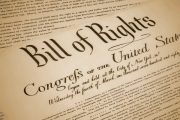
The virulently anti-gun group The Trace sent an e-mail blast to its members last week, alerting them to what it said was the danger of an overly and unnecessarily armed American citizenry:
Jennifer Mascia [a member of “TeamTrace”] pulled some numbers from the Small Arms Survey, which gauges gun stockpiles in the hands of civilians, law enforcement, and militaries around the world. She found that with an estimated 270 million firearms owned by everyday Americans, civilians own 70 times more weapons that all police and military services combined.
Mascia is an editorial assistant at the New York Times and was a regular contributor to its anti-gun column “The Gun Report” until it was shut down in 2014. Her source, the Small Arms Survey, is an international anti-gun group purporting to provide accurate statistics on all aspects of private gun ownership worldwide. Unfortunately, its reputation for accuracy has been tainted, with much of its reporting being challenged as “misleading or just plain wrong.”
In this instance, however, the numbers Mascia dug up from the outfit actually understated the “concerns” she expressed about how many firearms are owned by those “everyday Americans.” The real number isn’t 270 million — not even close — but is at least 100 million higher. And even that number is likely too small, given gun owners’ propensity not to be forthcoming to pollsters asking question about their gun ownership.
In any event, Mascia’s revelation is instructive: If she and her group are getting nervous, that’s good news for supporters of the Second Amendment — those supporters must be doing something right.
Indeed, if the goal of anti-gunners is total confiscation of all privately owned firearms (as has been shown repeatedly by mouthpieces such as California Democrat Senator Dianne Feinstein: “If I could have gotten 51 votes in the Senate … for an outright ban … ‘Mr. and Mrs. America, turn them all in,’ I would have done it.”) then their job has gotten a lot harder.
How would confiscation be accomplished? Writer and economic historian Gary North stated,
They could get some Americans to turn in their guns if the penalties were stiff enough. But the stiffer the penalties the tighter the really hard-core gun owners are going to hold onto their guns. The stiff penalties will send a message: “You were right. We are after your guns. Then we’re going to take your liberties.”
The numbers are truly daunting to the gun grabbers. It would mean that someone, or perhaps a team, would ultimately have to knock on the door of every household in America and demand the owner surrender his firearms. The fact that they would not know just where those firearms are and who owns them doesn’t help. Who would take on such a task? The local sheriff, who is running for reelection? A federal official, perhaps a U.S. marshall? But there are fewer than 4,000 U.S. marshalls in the federal government. They would need some help.
Could fedgov turn the military against the citizenry? None in the anti-gun media has even dared ask that question.
North asks just how gun confiscation could happen in, say, Harlem:
I can hear it now. You knock on the door. A man comes to the door. You ask him this: “Are you Willie Williams?” I can hear the response: “Who wants to know?” Your response: “I’m with the federal government. We have learned that you own a gun. I want you to go get that gun and hand it over to me.”
He might very well go and get his gun. I don’t think he would hand it over to you.
Attempts to register guns — not confiscation, mind you, just registration — in Connecticut are not going well. Demands that gun owners register their hated “assault” weapons with the state are being ignored by the vast majority of those owners. The latest reports are that fewer than one out of every seven are complying with the law, which totally baffles Connecticut pols, such as one of the bill’s supporters, state senator Tony Guglielmo:
I honestly thought from my own standpoint that the vast majority would register. If you pass laws that people have no respect for and they don’t follow then, then you have a real problem.
He’s right. He does have a problem. American gun owners even in the extremely liberal state of Connecticut are not simply going to roll over and give up their guns.
What about marginal attempts at confiscation such as legislation passed in Oregon, which would allow people to petition the government to take away a person’s guns? The NRAILA (National Rifle Association’s Institute for Legislative Action) expressed its outrage:
By allowing a law enforcement officer, family member, or household member to seek the [Extreme Risk Protection Order], SB 719A would allow people who are not mental health professionals, who may be mistaken, and who may only have minimal contact with the respondent to file a petition with the court and testify on the respondent’s state of mind.
This ex parte order, which strips the accused of their Second Amendment rights, would be issued by a judge based on the brief statement of the petitioner. The accused would not be afforded the chance to appear in court to defend themselves against the allegations when the ERPO is issued. These orders may be issued without any allegations of criminal behavior.
Well, not exactly. While neither this writer nor this website supports such incursions into precious rights, the NRAILA’s concerns are overblown. An ERPO can be requested only by law-enforcement officials, family members, and housemates, thus reducing the risk of vexatious or malicious requests. The order can be granted or denied only by a judge, within 24 hours.
The judge will have to consider the following factors in order to grant an ERPO:
• The request must be made under oath;
• Is there a history of suicide attempts or threats, or violence against others?
• Is there a history of attempted, threatened or actual use of physical force against others?
• Are there any previous convictions for misdemeanor violence, stalking, domestic violence, driving under the influence or animal cruelty?
• Is there evidence of recent illicit drug abuse? and
• Is there evidence of previous reckless or illegal use, brandishing or display of a deadly weapon?
If the person making the request is found to have knowingly provided the judge with false information or intended to harass the subject of the request, he can be sent to jail for up to a year.
Note please that all these restrictions were put in place in order to get this bill passed in one of the most liberal, anti-gun states in the country. Instead of marking it as a victory for the anti-gunners, Oregon’s passage is instead being taken as a warning by other states of such insidious invasions of precious rights.
What about confiscation of firearms during emergencies, such as that unfolding in Texas and Louisiana? After all, police in watercraft went from house to house in New Orleans in the aftermath of Katrina, confiscating firearms.
The Vitter Amendment, which became part of the 2007 DHS appropriations act, prohibited such violations. And since Katrina, most states have passed laws prohibiting the confiscation of firearms during such an emergency.
Americans are waking up to the threat of confiscation, either direct or indirect. Eternal vigilance is still required on the part of supporters of the Second Amendment; however, at present, momentum is on their side.
An Ivy League graduate and former investment advisor, Bob is a regular contributor to The New American magazine and blogs frequently at LightFromTheRight.com, primarily on economics and politics. He can be reached at [email protected].




